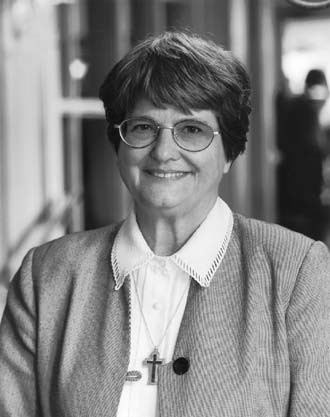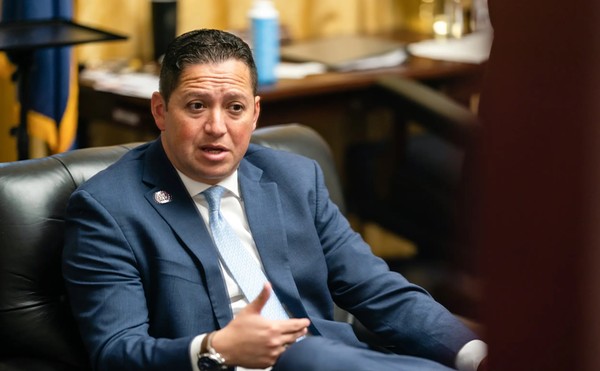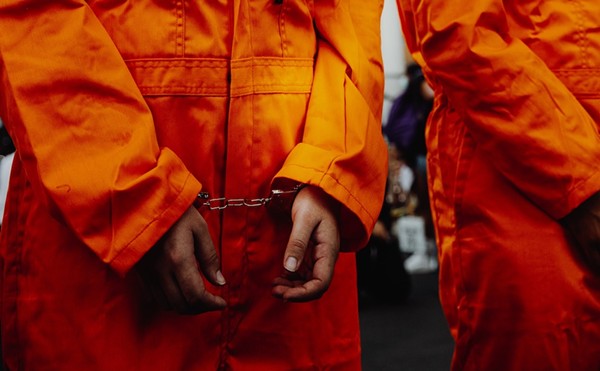|
Sister Helen Prejean visits San Antonio as yet another death row inmate dies One hour after Francis Newton is scheduled to die by lethal injection in Livingston, Texas, Sister Helen Prejean, author of Dead Man Walking, will speak in San Antonio. Prejean has spent the last 20 years in a global campaign to end the use of capital punishment; Newton is the first African-American woman to be executed in Texas since the death penalty was reinstated in 1976. 'Tis the season: Last week, Texas death row inmate Anthony Fuentes was executed. "Texas accounts for roughly a third of all the executions that have happened since the resumption of the death penalty," says Roger Barnes, sociology professor at the University of the Incarnate Word and organizer of the Prejean lecture. "So, when you talk about the death penalty, you have to come here. This is where the assembly line death machine is happening." Barnes expects Prejean to talk about her ongoing work and possibly her second book, The Death of Innocents: An Eyewitness Account of Executions, scheduled for release at the end of December. But, he says, her underlying message will be that the death penalty is intolerable in a civilized country. Is Texas ready to receive that message? According to a recent U.S. Justice Department report, the number of people sentenced to death dropped to a 30-year low in 2003, with 144 death row convictions in 25 states, 24 fewer than 2002. Coupled with a 2003 Gallup poll finding that support for the death penalty has dropped to 64 percent, its lowest level since 1978, it seems convincing that support for the death penalty is waning - at least nationally. Barnes believes the numbers reveal an overall social trend, fed in part by growing public discomfort with the death penalty as innocent people are continually released from death row. In October, Texas released Earnest Ray Willis who, through botched evidence and an unfair trial, was wrongly convicted for the arson-murder of two women and spent 17 years on Texas' death row. In January 2000, Governor George Ryan of Illinois imposed a moratorium on the death penalty in Illinois when it became clear that the system was broken. Since 1977, Illinois had executed 12 inmates, while 13 had been taken off death row after new evidence exonerated them or their cases collapsed. Barnes' theory seems like common sense, but so far, it isn't affecting sentiment in Texas. "The number of death sentences being handed out by juries has remained fairly constant in Texas," said Greg Wiercioch, staff attorney at the Texas Defending Service, a non-profit law firm in Michigan, who defends Texas death penalty cases, "which averages about 30-40 new people sent to death row every year." Wiercioch said Texas may be handing out death penalty convictions for lack of a better option: Texas is one of only two death penalty states that don't offer life without parole as an alternative to the death penalty. Forty-seven other states do, and, "It has been shown in study after study that, if jurors are given life without possibility of parole as an option, in close cases they are going to choose it rather than the default option of the death sentence," says Wiercioch. In Texas, if a defendant is convicted with a life sentence on a capital murder charge, they are not eligible for parole for 40 years. Most jurors, if they can't be confidently assured to the contrary, fear the person is going to get out and move in next door to them. "That's the fear, and prosecutors play on it," says Wiercioch. A 2003 poll found that although a majority of Texans support the death penalty, 72 percent of those surveyed said they would like juries to be given the sentencing option in capital cases of life without parole. The poll also shows that 69 percent of respondents believe the state has executed innocent people.
The death penalty is supported in Texas' highest office: Then-Governor George Bush infamously mocked Karla Faye Tucker by mimicking, with pursed lips and a simpering voice, her plea for clemency. Governor Rick Perry has refused to place a moratorium on Harris County executions despite overwhelming evidence that there are issues in the Houston crime lab - including 280 abandoned and mislabeled boxes of evidence - that would affect death row inmates. Likewise, the Fifth Circuit court of appeals had to force the Governor to comply with a U.S. Supreme Court ruling banning the execution of the mentally retarded. Counteracting support for the death penalty is also an issue of education. "The death penalty is very firmly entrenched in this culture" says Barnes. "Only recently has there been any organized, vocal opposition for the death penalty in Texas. And major newspapers only started editorializing the death penalty five or six years ago. "When you start the education process, folks start to say, 'Maybe this isn't such a good idea.' And then Sister Helen comes in, because she can really open up peoples minds as well as open up their hearts." Some death penalty proponents argue that it is an effective crime deterrent. Barnes disagrees. "If you have the death penalty and you carry it out frequently, you are supposed to lower your murder rate. But it doesn't work that way; it works just the opposite," says Barnes. According to a 2002 FBI crime report the murder rate rose in the South, where 90 percent of death row executions take place. And in the Northeast, where there were no executions, the murder rate dropped 5 percent. Nor does the death penalty save money. According to the Texas Department of Criminal Justice, it costs $61.58 to house a death row inmate, as opposed to $44 in general population, and the average death row inmate stays 10 years. The increased cost is due to higher security and the fact that inmates eat and sleep in their own individual cells. So what are you left with? "I think you are left with some kind of coarse, eye for an eye tooth for a tooth philosophy," says Barnes. "And I think we are seeing evidence today that people are becoming dissatisfied with that as the sole remaining explanation for the death penalty." Barnes says he takes hope in the fact that, last June, the New York city council voted 39 to 12 to call for a moratorium on executions until the death penalty is investigated for issues of fairness, justice, equality, due process, and cost. And, looking forward, the U.S. Supreme Court is scheduled to hear a case regarding the constitutionality of juvenile execution. Texas currently has 29 people on death row who are considered juveniles based on when they committed the crime. "Step by step the Supreme Court is scratching away at executions," Barnes says. "It's either going to come from the legislatures or the Supreme Court, but I see a future where the United States will come to its senses and get rid of the death penalty. Is it a long way off, or closer than we think? I don't know." • By Susan Pagani
|
Tags:

KEEP SA CURRENT!
Since 1986, the SA Current has served as the free, independent voice of San Antonio, and we want to keep it that way.
Becoming an SA Current Supporter for as little as $5 a month allows us to continue offering readers access to our coverage of local news, food, nightlife, events, and culture with no paywalls.
Scroll to read more San Antonio News articles
Newsletters
Join SA Current Newsletters
Subscribe now to get the latest news delivered right to your inbox.

















